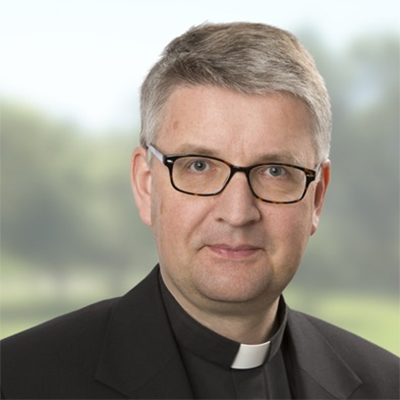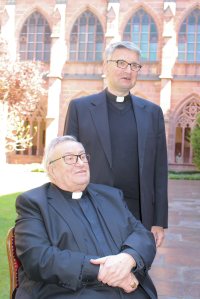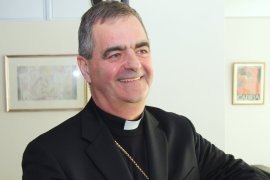I didn’t want to devote many words to this, as I thought that, sordid as the affair is, it is not a reflection of the Catholic Church in the Netherlands, nor does the priest responsible deserve his story to overshadow other, more positive news. But as it has now broken internationally (in English at Crux, and in German at Katholisch.de), I think I can at least share my thoughts. I published those thoughts in Dutch on Tuesday, and, as said, I wanted to leave it at that. But perhaps it is good to also share them in English.
First, the context:
 On 1 April, Father Pierre Valkering celebrated the 25th anniversary of his ordination to the priesthood. After the festive Mass he presented his autobiography, which he had been working on in secret over the past couple of years. In it, he describes not only his homosexuality, but also his addiction to pornography (going so far as to say that something of the Gospel may be found in pornography) and his past visits to dark rooms and other homosexual meeting areas. These revelations came as a shocking surprise to the diocese. In the past, Bishop Jos Punt had spoken at several occasions with Fr. Valkering about his celibacy, receiving the assurance that the latter was dealing with it “responsibly”. That was obviously a lie.
On 1 April, Father Pierre Valkering celebrated the 25th anniversary of his ordination to the priesthood. After the festive Mass he presented his autobiography, which he had been working on in secret over the past couple of years. In it, he describes not only his homosexuality, but also his addiction to pornography (going so far as to say that something of the Gospel may be found in pornography) and his past visits to dark rooms and other homosexual meeting areas. These revelations came as a shocking surprise to the diocese. In the past, Bishop Jos Punt had spoken at several occasions with Fr. Valkering about his celibacy, receiving the assurance that the latter was dealing with it “responsibly”. That was obviously a lie.
As a response, the bishop requested that Fr. Valkering cease his priestly duties for the time being and enter into a period of reflection. In a statement issued on 2 April, the diocese states:
“Father could also have chosen to discuss his struggle with his sexuality and celibacy openly and honestly with his bishop. That honesty would certainly not have been punished. On the contrary, together with Fr. Valkering ways could have been found to reflect upon it and receive help. That has in the past also been done for several other priests.
But Fr. Valkering has chosen for a sudden and public act, in which the bishop has not been known in any way. He has also not given any indication about whether he is willing or able to maintain his celibacy in the future.”
Below follows the opinion piece I shared in Dutch via Twitter and Facebook.
The piece below is not a discussion about the doctrine of the Church, homosexuality, sexual abuse in the Church or the mandatory celibacy for priests in the Catholic Church. This is my response to articles about the Amtserdam priest Fr. Pierre Valkering who was placed on leave by Bishop Jos Punt of Haarlem-Amsterdam following the publication of his autobiography. In that autobiography Valkering describes his homosexuality, his ignoring his oath to remain celibate by actively having sexual contacts and his appreciation for pornography. Separate from a discussion about these topics, the indignation about such behaviour by a Catholic priest is justified. Had Valkering written about heterosexual contacts, that indignation and the consequences for him would have been no different.
At first I thought it was an April Fool’s joke. A sensible conclusion to draw when someone publishes a book by his hand on that date, in which he prides himself in his sexual excesses, appreciation for pornography and regular visits to dark rooms and other gay meeting places. And this person is a priest of the Roman Catholic Church. No priest, who should have a more than superficial knowledge of what the Church teaches about sexuality and priesthood, would say something like that in all seriousness, right? It would have been a fine April’s Fools joke.
But nothing of the sort. Father Pierre Valkering apparently does not value the oaths he made at his ordination. Celibacy for priests is not a new thing. It existed long before there was a Pierre Valkering. But this priest seemingly considered it possible that an active sexual life was compatible with the priesthood, and thought he should speak about it proudly as well.
Valkering indicates that he has long struggled with his homosexuality and that his priesthood was essentialy a form of fleeing. That is something that must be taken seriously. That struggle and flight should have been prevented, and Valkering should have received the help he needed. His surroundings, including the Church, have failed him in that respect. It is to be hoped, therefore, that the period of reflection imposed upon him by Bishop Punt, can help him, and that he will not have to go through it alone.
I obviously do not know the exact cirucmstances which led Valkering to a crooked combination of priesthood and a seriously harmful form of sexuality. Bishop Punt probably also does not know, even though there have been meetings between priest and bishop in the past regarding previous publications and statements and the priest’s view on celibacy and his experience of it (he handled it responsibly, according the the diocese’s statment, but that apparently has a different meaning for Valkering than it did for the bishop). But with the bishop’s responsibility for assuring the correct communicatuon of the faith and the doctrine of the Church by his priests, Msgr. Punt could do little else than asking Fr. Valkering to lay down his duties, at least for now, and reflect on his actions.
The bishop shares the responsibility mentioned above with his priests. From his ordination and mission a priest has the duty of communicating the faith, by celebrating and teaching it, but also by being an example. The sexual excesses of Pierre Valkering, and the way in which he made them public, are an example which is contrary to the faith in all respects: he not only repeatedly broke his oath, but he also ignores his priestly mission and so leads others away from the faith. The way in which he thinks to express his sexuality are at odds with a healthy sexuality as the Church understands it. This is something one can disagree with, obviously. Discussion is always possible, but Valkering did not choose that option. Instead, he chooses a prideful form of deceit. He is a Catholic priest, but does not feel bound to the tasks and responsibilities of a priest. Instead of living for God, he chooses living for himself. He choose to lie to his bishop, to all the faithful for whom he was responsible as parish priest, and ultimately also to God.
With his autbiography, Valkering inflicts damage to the Church, to the people around him, and most of all to himself. Let us hope and pray that he may learn to see that and is offered and can accept the help he needs. The damage done in the past can’t be taken away, but perhaps its impact can be softened.”
 Flyers, an online petition, a banner in front of his residence, security measures at Mass… What has Bishop Georg Bätzing done to warrant such an outpouring of protest? Well, according to
Flyers, an online petition, a banner in front of his residence, security measures at Mass… What has Bishop Georg Bätzing done to warrant such an outpouring of protest? Well, according to  Almost a year after the retirement of Cardinal Karl Lehmann, all the dioceses of Germany have a bishop at the helm again – a situation that has not existed for several years. Succeeding the cardinal who led the Diocese of Mainz for 33 years is Father Peter Kohlgraf.
Almost a year after the retirement of Cardinal Karl Lehmann, all the dioceses of Germany have a bishop at the helm again – a situation that has not existed for several years. Succeeding the cardinal who led the Diocese of Mainz for 33 years is Father Peter Kohlgraf.
 “Of course there is resistance, but not specifically against the representatives of victims or the Commission. The entire topic of abuse is deeply terrible and frightening. Dealing with it and facing it requires a lot of courage. And I believe that many clerics, but also non-clerics, find this very difficult. This is not limited to the Curia. Last Monday – three years after the establishment of the Commission – I was able to speak for the first time about this topic to the Italian bishops in Bologna. It was the same in Ecuador and Colombia a few weeks ago, and next week it will be the same in Malawi. We must conclude that the topic of abuse has not yet registered worldwide. Not in the Church, but also not in society. But it can no longer be ignored now. That is also a merit of the Commission: it has made it public across the world. The question remains if those responsible in the Church will actively pursue the topic out of self-motivation, or only when scandals become public.”
“Of course there is resistance, but not specifically against the representatives of victims or the Commission. The entire topic of abuse is deeply terrible and frightening. Dealing with it and facing it requires a lot of courage. And I believe that many clerics, but also non-clerics, find this very difficult. This is not limited to the Curia. Last Monday – three years after the establishment of the Commission – I was able to speak for the first time about this topic to the Italian bishops in Bologna. It was the same in Ecuador and Colombia a few weeks ago, and next week it will be the same in Malawi. We must conclude that the topic of abuse has not yet registered worldwide. Not in the Church, but also not in society. But it can no longer be ignored now. That is also a merit of the Commission: it has made it public across the world. The question remains if those responsible in the Church will actively pursue the topic out of self-motivation, or only when scandals become public.” In an
In an 
 Big day in Berlin today, as Archbishop Heiner Koch is installed as its third archbishop and tenth bishop overall. The installation, starting at 11 o’clock local time, will be streamed live via
Big day in Berlin today, as Archbishop Heiner Koch is installed as its third archbishop and tenth bishop overall. The installation, starting at 11 o’clock local time, will be streamed live via  In
In  Archbishop Nikola Eterović has been the Apostolic Nuncio to Germany since November of 2013. Katholisch.de
Archbishop Nikola Eterović has been the Apostolic Nuncio to Germany since November of 2013. Katholisch.de